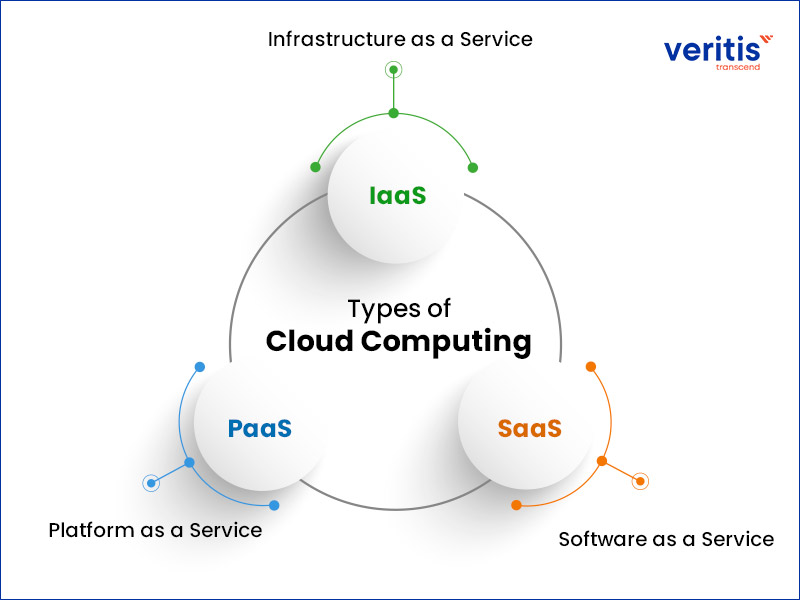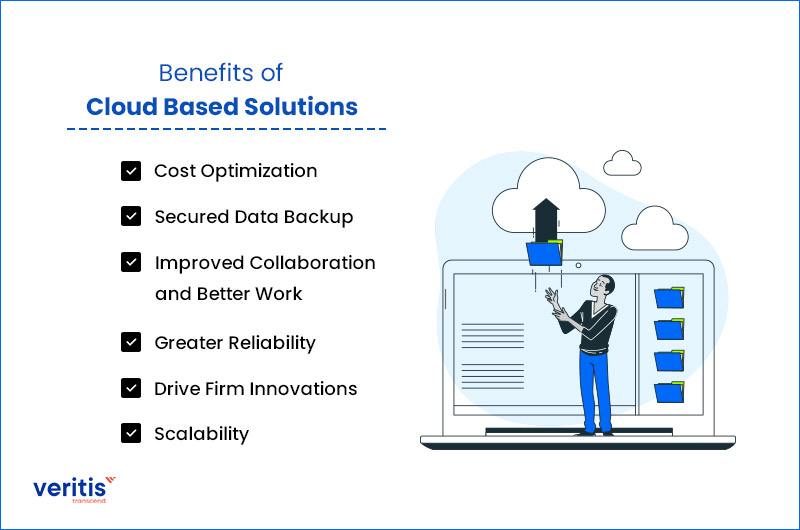
Table of contents
Cloud technology has become a vital tool for small and medium sized enterprises (SMEs), offering scalable SME cloud solutions that enable businesses to reduce costs and enhance productivity. By adopting a cloud strategy, SMEs can expand their operations and compete with larger firms in a more dynamic marketplace. Veritis provides tailored cloud based business solutions, ensuring SMEs can harness the power of cloud computing while maintaining security and efficiency.
Veritis offers a wide range of cloud based enterprise solutions, including improved data security, reduced downtime, flexible storage options, and remote access. These features are essential for businesses aiming to optimize resources and manage customer relationships more effectively. With Veritis, SMEs can fully leverage the benefits of cloud services, ensuring their operations run smoothly while maintaining security.
Veritis offers comprehensive IT cloud consulting services, including the deployment and management of cloud based applications designed specifically for SME needs. Whether through cloud migration, data management, or application support, Veritis ensures that your business leverages the most advanced cloud based IT solutions. With Veritis as your trusted partner, you can maximize the potential of cloud technology for long term growth and success.
Consult our Cloud Consulting Expert
What is Cloud Computing? Cloud computing is the on demand provision of computer services over the internet, such as software, data processing, and data storage. Cloud computing services are often paid for on a pay as you go basis. So, you only pay for the cloud services and applications you utilize. This strategy enables flexible growth and lowers your company’s operating costs.
In today’s rapidly evolving business environment, small business owners need access to data and apps from their PCs, tablets, or mobile devices. Whether at work, on the road, or in the field. This access from anywhere is made possible via cloud insights and an internet connection.
Instead of storing files on an exclusive hard disc or local storage device, they can be saved to a remote database thanks to cloud based solutions storage. Furthermore, a device with internet access can access the data and software programs required to run them.
Types of Cloud Services
No matter the service type, cloud computing services provide users with several benefits, such as:
- On demand software delivery
- Data retrieval, backup, and storage
- Developing and testing apps
- Streaming audio and video
- Analyzing Data
Although cloud native applications are a relatively new technology, they are used by multiple industries, including large corporations, small businesses, charitable organizations, governmental agencies, and even individual consumers.
Useful link: What is Cloud Computing?
Types of Cloud Computing

Cloud computing is not a standalone technology like a chip or phone. Instead, it is a system made up mainly of three Types of Cloud Computing Services: Platform as a Service (PaaS), Infrastructure as a Service (IaaS), and Software as a Service (SaaS).
1) Platform as a Service (PaaS)
PaaS is regarded as the most complicated of the three cloud computing layers. While SaaS and PaaS are comparable in some respects, the main distinction is that PaaS delivers software offline rather than online. It is a platform for software development that is made available online. Platforms like Salesforce.com and Heroku are part of this strategy.
2) Infrastructure as a Service (IaaS)
IaaS refers to a technique for providing anything as part of an on demand service over IP based connectivity, including operating systems, servers, and storage. So, instead of buying servers or software, clients can use an on demand, outsourced service to obtain these resources. Microsoft Azure and IBM Cloud are two common instances of the IaaS system.
3) Software as a Service (SaaS)
SaaS refers to licensing software applications to users. A pay as you go or on demand mechanism is generally used to provide licenses. For instance, this kind of mechanism is available in Microsoft Office 365.
Useful link: What are the Different Types of Cloud Computing Services?
Benefits of Cloud Based Solutions

Enterprises from all sectors can benefit from using cloud based software, which can be accessed by the browser or native apps on any device. Additionally, users can seamlessly transfer their files and settings from one device to another. There are a few benefits of cloud computing. Let’s have a look!
1) Cost Optimization
Cloud Cost Optimization is one of the main advantages of cloud computing, driving significant operational cost efficiency. If you switch to a cloud ERP system, you will need to install fewer IT systems and incur lower maintenance costs. In addition, although I wouldn’t advise SMEs to abandon their IT teams completely, moving most of their activities to cloud adoption will significantly reduce the burden on those teams. Finally, cloud resources offer a practical means of accommodating spikes in corporate activity or transaction volume that could bring down conventional systems.
First, you can refrain from substantial capital investments in acquiring, upgrading, and maintaining prohibitively expensive servers, PCs, and associated software or hardware. In the long run, cloud based solutions offer great operational cost certainty because the service providers oversee the system’s security, upkeep, and upgrades.
2) Secured Data Backup
Data loss can be disastrous for a small firm. It’s not just because the files were lost; restoring them takes time and money. According to CloudRadar, a network outage costs above USD 10,000 per hour.
Most small firms don’t invest in dependable data recovery; it’s more of an ideal. Many SMBs are now turning to cloud computing to counter this trend for small businesses. Cloud based services can quickly recover data from all types of data disasters due to their size and competence, including remotely deleting data from a lost laptop.
3) Improved Collaboration and Better Work
According to Gartner, 74 percent of CFOs want to transfer 5 percent of their employees to remote jobs permanently. Thus, even if the pandemic may have expedited the remote working trend, most firms, particularly SMEs, are now aware of its potential benefits for operational effectiveness. Because of this, cloud computing models for remote workers have significantly increased globally.
Remote employees can connect and communicate with other teams with the help of cloud based monitoring. SMEs and established enterprises observe a paradigm shift in operational efficiencies because of mobile information access. The cloud ERP system serves as a platform that ensures fast and secure access to information and has enabled everyone to operate remotely. You can immediately produce the necessary data before the IT department.
4) Greater Reliability
Services delivered over the cloud infrastructure are frequently more dependable than services provided on premises, especially if servers or other hardware need to be updated. Since cloud solution providers have a dedicated, experienced IT staff, they can handle issues more quickly than small businesses with limited IT resources.
5) Drive Firm Innovations
What if your company had a secret weapon to save expenses, please customers, boost productivity, open new revenue streams, and expand into new markets? According to a recent IBM Institute for Business Value study, cloud based monitoring generates revenue for SMEs and organizations in many sectors. According to this survey, cloud based workflow gives SMEs the ability to;
- Obtain simple access to a new market or sector
- Increase service or product features while maintaining usability
- Acquire new clients
- Introduce innovative client journeys crafted for distinct client experiences.
- Develop, create, and launch services and products quickly
Most businesses began utilizing cloud resources for small businesses about half a decade ago to reduce operational costs and streamline their IT infrastructure. However, you don’t use the power of cloud based software to drive enterprise innovation today. Then, your company runs the danger of being outflanked by competitors.
6) Scalability
Scalability is the ability to adjust IT resources to accommodate shifting business needs in cloud services for business. It is the most defining characteristic of cloud computing models and why SMEs embrace it exponentially.
The existing cloud computing infrastructure allows for the scalability of data storage capacity, networking, and processing power. In addition, unusually, little to no downtime or interruption is required to complete it swiftly.
Useful link: Cloud Computing: Trends, Challenges and Benefits
The 2025 Advantage: What Cloud Based Solutions Mean for SMEs Today
Modern cloud based business solutions are not just cost savers; they’re robust growth drivers and security enablers for small businesses, providing a sense of reassurance and confidence:
- Improved Security: 60% of C-suite leaders now cite enhanced cloud security as the top benefit of cloud adoption, surpassing even cost savings and scalability. Cloud automation, with features such as automated backups and updates, reduces the risks associated with human error and misconfiguration.
- Revenue Impact: SMEs that moved over 60% of their workloads to the cloud achieved up to 11% YoY revenue growth, compared to their peers.
- Faster Go to Market: Cloud based solutions reduce product launch cycles by up to 65%, enabling small businesses to adapt more quickly in dynamic markets.
If you’re an SME evaluating cloud based solutions for your business, these statistics highlight both the urgency and opportunity.
Ensuring Security and Privacy in Cloud Computing for SMEs

1) The Importance of Cloud Security for SMEs
In the digital domain, small and medium sized enterprises (SMEs) are increasingly adopting cloud based solutions to stay competitive. While cloud computing delivers multiple advantages, such as cost efficiency and scalability, it also brings new challenges in ensuring security and privacy.
Veritis understands the unique needs of SMEs, providing tailored cloud based IT solutions that prioritize data security and privacy at every step. Leveraging our IT cloud services can ensure your business reaps the benefits of cloud services without compromising sensitive information.
2) Data Encryption for Business Protection
Data encryption is one of the cornerstones of maintaining security and privacy in the cloud. With encryption, access to sensitive information is restricted to approved users, whether data is at rest or in transit.
Veritis offers robust cloud based enterprise solutions that incorporate advanced encryption technologies. Our cloud based business solutions make encryption seamless and effective, protecting your business data from unauthorized access while enhancing your overall security posture.
3) Multi Factor authentication for Strong Access Control
For SMEs, it is critical to have vigorous access control measures in place to prevent unauthorized users from accessing sensitive data. Multi factor authentication (MFA) is an easy but highly effective method for boosting security that ensures only legitimate users can access your cloud based applications.
Veritis integrates MFA into all our cloud based IT solutions, offering your business an additional layer of security. Our IT cloud services are designed to help SMEs maximize the benefits of cloud services while maintaining stringent access controls.
4) Regular Security Audits for Continuous Protection
Security and privacy in the cloud are not one time tasks but require ongoing monitoring and management. Veritis helps SMEs conduct regular security audits of their cloud based solutions to identify vulnerabilities before they can be exploited.
With our cloud based enterprise solutions, businesses can ensure they are always a step ahead when securing their cloud environments. Veritis provides end to end IT cloud services that guarantee continuous data protection, allowing you to focus on business growth.
Best Practices for Security and Privacy

1) Data Backup and Disaster Recovery
Incorporating a robust data backup and disaster recovery plan is crucial in mitigating risks associated with data loss. Veritis’ cloud based business solutions are designed with built in backup and recovery systems that ensure data is quickly recoverable in case of an unforeseen incident. Our cloud based IT solutions provide businesses with the peace of mind they need, knowing their data is securely backed up and protected.
2) Compliance with Industry Standards
With increasing regulatory requirements, businesses need to ensure that their cloud based solutions comply with industry standards. Veritis offers cloud based enterprise solutions that help businesses meet compliance needs while maintaining high levels of security.
From GDPR to HIPAA, our IT cloud services ensure that your business adheres to all necessary regulations, allowing you to focus on realizing the benefits of cloud services without worry.
3) Secure Configuration and Updates
The security of cloud based applications heavily depends on their configuration and timely updates. Veritis works closely with SMEs to ensure that their cloud based IT solutions are configured securely and receive regular updates to combat evolving security threats.
Our IT cloud services are designed to keep your cloud infrastructure up to date and fully secure, permitting you to leverage the full benefits of cloud services without vulnerabilities.
4) Employee Training for Security Awareness
The security of your cloud infrastructure is only as strong as your employees’ understanding of it. At Veritis, we emphasize the importance of employee training as part of our cloud based business solutions. Providing employees with the tools to follow strong data security protocols, prevent phishing, and secure access to cloud based applications reduces the risk of human error.
Our IT cloud services include comprehensive training programs that empower your team to uphold the highest security standards.
Making the Right Cloud Move: Readiness, Options, and Cost Control
Implementing cloud based solutions successfully requires a clear roadmap. Here’s how SMEs can plan with precision:
Cloud Readiness Checklist
- Audit your current IT infrastructure and software stack
- Evaluate compliance and data protection needs
- Consider integration with existing business tools
- Assess team capabilities and vendor support
Choosing the Right Deployment Model
- Public Cloud: Low cost, fast setup, ideal for startups
- Private Cloud: More control, suitable for sensitive data
- Hybrid Cloud: Combines on-prem and cloud for flexibility
- Multi Cloud: Diversifies risk and avoids vendor lock in
Practical Cost Governance Tips
- Set usage alerts and budget thresholds
- Track idle resources and shut them down regularly
- Use showback/chargeback models to improve visibility
- Monitor spending with real time dashboards
These strategic steps ensure your SME reaps the full value of cloud based solutions without overextending budgets.
Case Study: Empowering a Petcare SME with Secure and Scalable Cloud Storage
Veritis partnered with a mid sized pet care enterprise to implement a secure cloud storage solution that addressed its growing data management needs. As a fast scaling SME, the client required a flexible, cost effective, and compliant cloud environment. Veritis delivered a tailored cloud architecture that ensured data integrity, ease of access, and future scalability, thereby enabling the client to focus on business growth. At the same time, Veritis implemented robust security controls.
This real world example vividly demonstrates how cloud based solutions can equip SMEs with a strategic advantage, enhancing operational efficiency, improving data security, and increasing scalability.
Read the complete case study: Secure Cloud Storage Enabled for Petcare Enterprise.
Conclusion
There is no doubt that cloud solutions have a wide range of benefits for small and medium business owners. They enable you to focus on your mission and core competencies while leaving the rest to the cloud platform. In addition, the scalability and flexibility of cloud computing solutions allow you to advance quickly and gain competitive advantages.
Significant potential is being lost if your SME doesn’t have cloud solutions. This is an opportunity to develop, take the lead, and be inspirational. The industry is highly competitive; therefore, utilizing technologies that can streamline business operations and reduce time will be beneficial.
Veritis, a Stevie Award winner, offers IaaS, PaaS, and SaaS solutions to many global SMEs. The benefit of our cloud and IT solutions is that they significantly improve their overall business process. If you believe it’s the right time to experience the ride of the cloud, contact Veritis to learn more about our customized services.